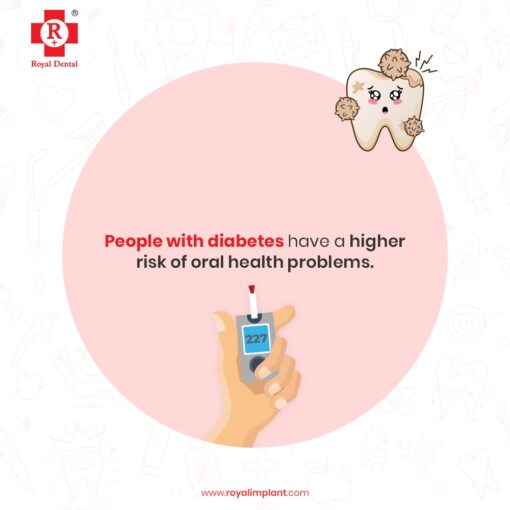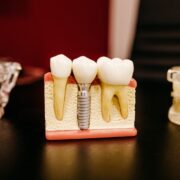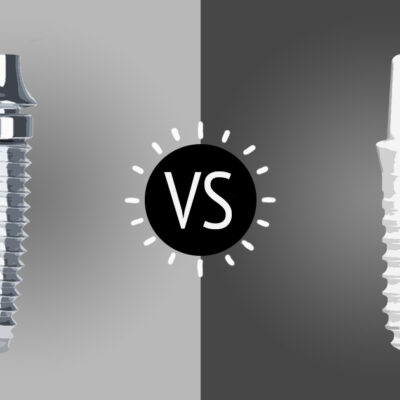Diabetes and some medicines used to treat diabetes can cause the salivary glands in your mouth to make less saliva. When less saliva flows, the risk for dental cavities, gum disease, and other mouth problems increases. Diabetic patients under good medical control are generally eligible and able to tolerate any and all types of dental care. One of the common complications your dentist wants to avoid having to manage is hypoglycaemia. An excellent way to keep your risk factors low is by practicing good oral health habits. Because diabetics are more susceptible to developing certain oral diseases and conditions, it’s important that you take specific steps to prevent them as a result of having diabetes. Keep reading to learn more about dental risks for diabetic patients, and how to prevent them.
What is a dental care risk for diabetic patients?
Any health condition that affects your mouth can pose a risk to your general health. That’s why it’s particularly important for people with diabetes to take care of their teeth. Diabetic patients face an increased risk of developing gum disease, periodontal disease and tooth decay. Unfortunately, these three oral health issues are very common in people with the condition. If you have diabetes, you are 2 times more likely to have periodontal disease than a person without diabetes.

If left untreated, gum disease can increase your risk of heart disease, stroke and kidney disease. This is largely due to the fact that chronic gum disease can cause your body to produce an excess of antibodies that can lead to inflammation and infection. Diabetic patients are also at a higher risk for oral ulcers, tooth loss and denture stomatitis (inflammation of the gums around dentures). These are all serious but manageable risks that can be reduced by taking good care of your teeth and mouth.
Proper dental care for diabetic patients
Make a commitment to manage your diabetes. Monitor your blood sugar level, and follow your doctor’s instructions for keeping your blood sugar level within your target range. The better you control your blood sugars, the less likely you are to develop gingivitis and other dental problems.
Brush your teeth at least twice a day. Brush in the morning, at night and, ideally, after meals and snacks. Use a soft-bristled toothbrush and toothpaste that contains fluoride. Avoid vigorous or harsh scrubbing, which can irritate your gums.

- Floss your teeth at least once a day. Flossing helps remove plaque between your teeth and under your gumline. If you have trouble getting dental floss through your teeth, use the waxed variety. If it’s hard to manipulate the floss, use a floss holder.
- Schedule regular dental visits. Visit your dentist at least twice a year for professional cleanings, X-rays and checkups.
- Make sure your dentist knows you have diabetes. Every time you visit your dentist, remind him or her that you have diabetes. Make sure your dentist has contact information for your doctor who helps you manage your diabetes.
- Look for early signs of gum disease. Report any signs of gum disease — including redness, swelling and bleeding gums — to your dentist. Also mention any other signs and symptoms, such as dry mouth, loose teeth or mouth pain.
- Don’t smoke. Smoking increases the risk of serious diabetes complications, including gum disease and ultimately, loss of your teeth. If you smoke, ask your doctor about options to help you quit.
Dental care risks for diabetic patients
- Gum Disease: People with diabetes are at a greater risk of developing periodontal disease, a bacterial infection of the gums. If left untreated, this can lead to tooth loss, chronic infections and heart disease.
- Tooth Decay: Because diabetics have a limited ability to fight off bacteria, they are more likely to develop cavities. Regular dental visits can help you catch and treat tooth decay early before it spreads and becomes a serious issue.
- Oral Ulcers: Diabetes can cause your immune system to become overactive, which can lead to oral sores that don’t heal.
- Tooth Loss: Because of their limited ability to fight off bacteria, diabetics are more likely to have tooth decay caused by bacteria. Tooth loss can be prevented by careful daily oral hygiene.
- Denture Stomatitis: Diabetics are at a higher risk of developing an inflammatory reaction to the materials used in dentures. This can be treated with appropriate cleaning regimens.
Other tips to manage diabetes-related dental care risks
Eat a healthy diet. Maintain a balanced diet that is high in fiber and low in sugar, sodium and fat.
Schedule regular dental checkups. Your dentist can help you manage your diabetes by detecting and treating oral issues early.

Use fluoride. Fluoride-containing toothpastes can help prevent tooth decay. There are also special fluoride gels and varnishes that can be applied by your dentist to help prevent tooth decay.
Get gum disease treated early. If you already have gum disease, try to treat it with appropriate antibiotics.
Conclusion
Oral health issues can lead to serious health complications, and many people with diabetes are not receiving the dental care they need. By following these tips, you can reduce the risk of developing dental issues as a result of having diabetes. Diabetes and some medicines used to treat diabetes can cause the salivary glands in your mouth to make less saliva. When less saliva flows, the risk for dental cavities, gum disease, and other mouth problems increases.






